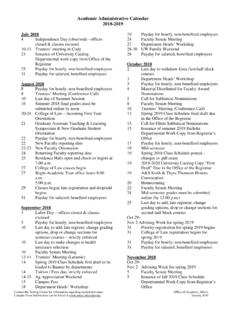Transcription of SAMPLE SABBATICAL LEAVE POLICY - Presbytery of Boise
1 1 SAMPLE SABBATICAL LEAVE POLICY INTRODUCTION The following document is offered as a recommendation and template for congregations to develop standing policies for SABBATICAL or Renewal leaves for pastoral members. It is the desire of the Committee on Ministry of Boise Presbytery that all congregations adopt some form of SABBATICAL LEAVE POLICY for the health and well being of both pastors and churches. POLICY Statement The Presbytery of Boise recommends to the sessions of the churches that Ministers of the Word and Sacrament be granted a compensated SABBATICAL of at least three (3) months after six (6) years of service to an individual church. Committee on Ministry Responsibilities 1. Review the SABBATICAL timetable and usage plan as submitted by the minister. 2. Serve as mediator in any concerns of session, minister relative to the SABBATICAL .
2 3. Determine who will moderate the session in the minister s absence. Minister Responsibilities 1. Bring the SABBATICAL proposal before the session-at least in outline form-a minimum of six months, or far enough in advance to be covered by the church s budget and staffing plans, before the intended commencement of the SABBATICAL . 2. Secure the approval of the session for the SABBATICAL proposal and work out the necessary coverage of pastoral and pulpit responsibilities. 3. Assure the session of continued service to the church for at least eighteen months from the conclusion of the SABBATICAL . 4. Bring up to date all pending responsibilities as determined in consultation with the session before departing on a SABBATICAL . 5. Submit to the Committee on Ministry, in writing, the SABBATICAL timetable and outline of plans.
3 6. Upon return, present an overview of the SABBATICAL experience to the session, congregation and the Committee on Ministry. Session Responsibilities 1. Receive for approval the minister s proposal for a SABBATICAL , at least six (6) months in advance of the intended commencement of the SABBATICAL . 2. Continue terms of call commitments to the minister during SABBATICAL LEAVE . 3. Communicate to the congregation the importance and value to the church of a SABBATICAL . 4. Request a written overview of the SABBATICAL from the minister upon return. 5. If agreed upon by session and the minister, the SABBATICAL might be combined with vacation time and study LEAVE for extended graduate study. The following Rationale if for information only. 2 Rationale SABBATICAL LEAVE is a planned time of renewal by which a minister seeks personal and professional growth.
4 SABBATICAL LEAVE may include continuing education, spiritual formation, mentoring with respected teachers, and personal refreshment. It is an opportunity for an individual to disengage from regular and routine tasks so that their ministry may be viewed from a new perspective. SABBATICAL LEAVE is an extension of the biblical concept of the Sabbath year of renewal. It is both an act of faith that God will sustain us through a period of reflection and an occasion for the renewal of vital energies. The goal of the SABBATICAL LEAVE is to allow the minister to return to the responsibilities of the parish with renewed energy, spiritual vision, and effectiveness. Ministers who have the opportunity to reflect on issues of professional growth and development are more likely to stay more years in a particular call.
5 SABBATICAL LEAVE is qualitatively different from time off or vacation in that there is a plan for personal and professional renewal. Neither vacation nor study LEAVE should be affected by SABBATICAL LEAVE . However, accrued vacation or study LEAVE may be taken in conjunction with the SABBATICAL LEAVE , adding no more than four additional weeks to the SABBATICAL LEAVE . Sabbaticals: Are They Really Needed? The subject of SABBATICAL LEAVE for pastors is often met with a chorus of questions. High on the list is some form of: Why should the pastor have a SABBATICAL ? I don t get one in my profession, nor do any of the people I work with. The business world is tough, too! While the concept of the SABBATICAL has long been recognized in the academic community, the church has been a bit slower to recognize its value.
6 Are they really necessary? Let s address that question from a practical and biblical perspective. The Biblical Sabbath The Scripture contains numerous references to the Sabbath, not only as a day set aside as holy to the Lord, but as a basic rhythm of life for God s covenanted people. Consider the following (all quotations are from the NRSV): Remember the Sabbath day and keep it holy. Six days you shall labor and do all your work. But the seventh day is a Sabbath to the LORD your God; you shall not do any work you, your son or your daughter, your male or female slave, your livestock, or the alien resident in your towns. For in six days the LORD made heaven and earth, the sea, and all that is in them, but rested the seventh day; therefore the LORD blessed the Sabbath day and consecrated it.
7 (Exodus 20:8-11) Six days shall work be done; but the seventh day is a Sabbath of complete rest, a holy convocation; you shall do no work: it is a Sabbath to the LORD throughout your settlements. (Leviticus 23:3) Six years you shall sow your field, and six years you shall prune your vineyard, and gather in their yield; but in the seventh year there shall be a Sabbath of complete rest for the land, a Sabbath for the LORD: you shall now sow your field or prune your vineyard. You shall not reap the after-growth of your harvest or gather the grapes of your un-pruned vine: it shall be a year of complete rest for the land. (Leviticus 25:3-5) 3 And you shall hallow the fiftieth year and you shall proclaim liberty throughout the land to all its inhabitants. It shall be a jubilee for you: you shall return, every one of you, to your property and every one of you to your family.
8 (Lev. 25:10) The Hebrew word shabbat literally means to cease or stop. Scripture shows us a God-ordained rhythm of work and rest, both for a short-term cycle (weekly) and an extended cycle (the year of Jubilee). In the New Testament there are two important example of this rhythm (although we don t usually see them in this light). Just before initiating his public ministry, Jesus spent forty days alone to fast and pray (Matt. 4:1-11; Mark 1:12-13; Luke 4:1-13). The Apostle Paul, following his conversion, spent time in obscurity in his home area before Barnabus sought him out for his life s vocation (Acts 11:25). While neither of these New Testament examples could be called a SABBATICAL in the contemporary sense, they illustrate an important principal: an investment in reflection and spiritual renewal only serves to enhance a servant of Christ s ministry.
9 If in the contemporary church we are truly interested in growing God s Kingdom, and not just hours clocked in, we would do well to consider the example. The SABBATICAL : A Renewing Break from the Pressure Cooker In his book Support Your Local Pastor, Wes Roberts quotes from a revealing survey of pastors conducted by Dr. Arch Hart of Fuller Theological Seminary in 1991. It reported the following: 90% of pastors work more than 46 hours per week, and often more than 60. 80% believe that pastoral ministry has had a negative effect on their family. 33% agreed, Being in ministry is clearly a hazard to my family. 75% have reported a significant crisis due to stress at least once every five years in their ministry. 50% feel unable to meet the needs of their job. 90% feel they were not adequately trained to cope with the ministry demands placed upon them.
10 40% reported having serious conflict with a parishioner at least once a month. 37% have been involved in inappropriate sexual behavior with someone in the church. 70% report lower self-esteem after they have served as a pastor than before they What makes ministry so demanding and stressful? Roberts answers with the following bit of musing: The lawyer can refuse to take on a client. The pastor may feel like refusing to see someone come into his or her congregation, but does not have that privilege. The doctor can refer out to another doctor when it is best for the patient or the doctor. The pastor is not often prone to send people to another church, though he or she may be thinking that in tough moments. The electrician can say, I can t fix your problem for two days, and we can call the next service person on our list, who can come out right away.







